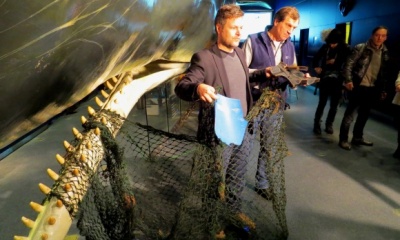‘Large quantities’ of plastic found in beached whales’ stomachs

The whales were beached near the coastal town of Tönning in the northern German state of Schleswig-Holstein in January and February.
Though the state’s environment minister, Robert Habeck, said during a presentation of the findings last week (23 March) that the plastic would not have been the cause of the whales’ beaching and death, biologists involved in the study believe that the worst-affected would have had ‘major health problems’ due to the remains of the waste.
Amongst the items found in the whales were the remains of a 13-metre-long and 1.2-metre-wide safety net used in the shrimp fishing industry, a 70-centimetre-long plastic cover from the engine compartment of a car and the ‘sharp-edged’ remains of a plastic bucket.
The 13 whales were stranded on the state’s North Sea coast earlier this year and the post-mortem investigation found that they were all young, not yet sexually mature bulls ranging from 10 to 15 years old and weighing 12 to 18 tonnes. Investigators from the Institute of Terrestrial and Aquatic Wildlife Research of University of Veterinary Medicine Hannover concluded that the whales had fallen into shallow water and due to the weight of their bodies had died of ‘acute cardiovascular failure’.
The whales studied were among the 30 sperm whales that have been beached, dead or alive, on the North Sea coast since the beginning of the year. Though the reason for the mass beaching of the whales, which usually spend the winter in the North Atlantic, is unknown, investigations are underway into whether the noise from sea traffic and oil platforms are interfering with the animals’ acoustic signals and navigation.
Study highlights effects of the plastic society
Commenting on the findings, Habeck said: "These findings show us the effects of our plastic society: animals inadvertently eat plastic and other plastic waste and suffer, or worse, starve with stomachs full of it. This is a stark warning that intensified action against garbage in the sea is needed in Schleswig-Holstein.”
"Our common ‘Fishing for Litter’ initiative with the Nature and Biodiversity Conservation Union (NABU), the support of a plastic-free regions model and garbage collection campaigns are already helping to make a real difference and to change attitudes in society. But we can solve only the problem so much. Schleswig-Holstein will be used for necessary legal regulations at the federal or EU level, and for a ban on microplastics.”
Action against marine plastic
Plastic waste in the world’s oceans is becoming a hot topic, after a report published by the Ellen MacArthur Foundation this year predicted that by 2050, the world’s oceans could contain more plastics than fish, by weight.
The United States has already moved to ban the use of microbeads, tiny bits of plastic less than five millimetres wide, mainly made from polyethylene (PE), in cosmetic products from 2018, after a study published in the American Environmental Science and Technology journal reported that over eight trillion microbeads were entering the nation’s waterways every day – enough to cover the surface of 300 tennis courts.
Earlier this month the UK’s Environmental Audit Committee (EAC) launched an inquiry into the environmental impact of microplastics. The watchdog has already called for written evidence on how microplastics impact on marine plants and animals, what economic consequences could result from their increased pollution of oceans, and their impact on human health.
Due to their size, microbeads are able to slip through water filtration systems and subsequently often end up in waterways. The beads do not biodegrade and are liable to be ingested by marine wildlife such as fish and birds. While some fish can excrete plastic, others cannot and so accumulate plastic in their body. A study published for the Convention on Biological Diversity found that around 35 per cent of fish have microplastics in their stomachs, with one fish examined containing 83 fragments of plastic.
Meanwhile, The Ocean Cleanup organisation plans to test a barrier designed to trap plastic bags, bottles and other marine litter in the North Sea this year. Set up by 21-year-old entrepreneur Boyan Slat, the group aims to develop technologies to extract, prevent and intercept plastic pollution. Deploying the barrier off the coast of The Hague represents the latest testing stage of the technology, which the organisation hopes will eventually be deployed as a 62-mile long barrier in the Great Pacific Garbage Patch, an area of the Pacific Ocean thought to contain a third of the world’s ocean plastic, in 2020.






